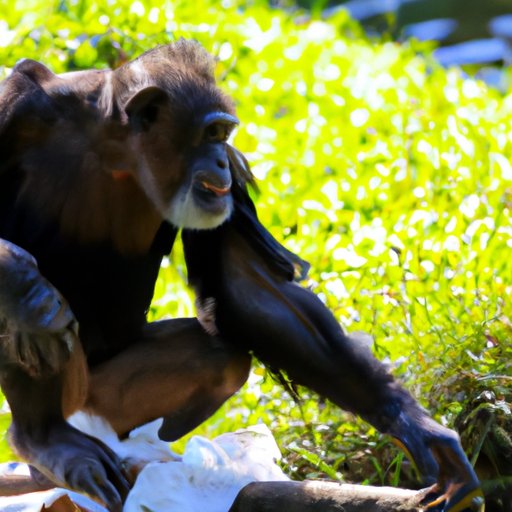Introduction
Jane Goodall is one of the most renowned figures in primatology and animal rights. Her pioneering research on chimpanzee behavior has contributed significantly to our understanding of animal behavior and human evolution. Throughout her remarkable career, she has made many groundbreaking discoveries, raised awareness on animal rights, and established initiatives aimed at protecting endangered species. This article will explore Jane Goodall’s contributions to science, and her lasting impact on future generations.
Exploring the Impact of Jane Goodall’s Primatology Research
Before Jane Goodall began her studies in Tanzania in 1960, very little was known about chimpanzees. Goodall revolutionized the field of primatology by studying chimpanzees in their natural habitat, rather than in captivity. Her observations of chimps revealed a great deal of insight into their social and cultural behaviors.
Goodall was the first to observe tool usage among chimpanzees. She documented how they used sticks to extract termites from their mounds, and observed that they sometimes modified branches in order to create more effective tools. This discovery challenged the widely-held belief that humans were the only species capable of making and using tools.
Goodall also played an important role in the development of the Gombe Stream National Park in Tanzania, which was established to protect the chimpanzees she had studied. This park is now home to over 100 chimpanzees and serves as an important source of data for ongoing research.
Examining Jane Goodall’s Groundbreaking Scientific Discoveries
Goodall’s research has yielded a wealth of information about chimpanzee behavior. She discovered that chimpanzees are capable of social and cultural behaviors, such as forming alliances, engaging in cooperative hunting, and displaying signs of emotion. She also documented evidence of meat-eating habits, which was previously thought to be unique to humans.
Most notably, Goodall’s observations demonstrated that chimpanzees are capable of making and using tools. This revolutionary discovery challenged the notion that this ability was exclusive to humans and provided new insights into human evolution. According to Goodall, “We must accept that there is no sharp line between humans and animals.”
An Analysis of Jane Goodall’s Work in Conservation and Animal Welfare
In addition to her scientific research, Goodall has dedicated much of her life to conservation and animal welfare. In 1977, she founded the Jane Goodall Institute (JGI), which is dedicated to promoting conservation and protecting endangered species. JGI works with local communities to develop sustainable solutions to environmental challenges, and has established numerous projects aimed at protecting wildlife and habitats.
Goodall has also been a vocal advocate for animal rights. She has spoken out against animal testing, factory farming, and other practices that exploit or harm animals. She has raised awareness of the need to respect and protect animals, and has inspired countless people to become involved in conservation efforts.
The Legacy of Jane Goodall’s Pioneering Work in Primatology
Jane Goodall’s groundbreaking research in primatology has had a lasting impact on the field. Her observations of tool use and meat-eating habits opened up new avenues of inquiry into the evolution of human behavior. Her work has also served as a basis for subsequent primatology studies, helping to further our understanding of animal behavior.
Goodall’s legacy extends beyond her scientific achievements. Her dedication to conservation and animal welfare has inspired generations of people to take action and make a difference. She has taught us to approach animals with empathy, compassion, and respect, and to recognize our shared responsibility in protecting the environment.
Conclusion
Jane Goodall’s contributions to science have had a profound impact on our understanding of animal behavior and human evolution. Her pioneering work in primatology revealed a great deal of insight into the social and cultural behaviors of chimpanzees, and her observations of tool usage challenged the widely-held belief that this ability was exclusive to humans. Goodall has also dedicated much of her life to conservation and animal welfare, raising awareness on the need to protect endangered species and respect animal rights. Her work has not only shaped the field of primatology, but has also left a lasting legacy of empathy, compassion, and respect for animals.
(Note: Is this article not meeting your expectations? Do you have knowledge or insights to share? Unlock new opportunities and expand your reach by joining our authors team. Click Registration to join us and share your expertise with our readers.)
